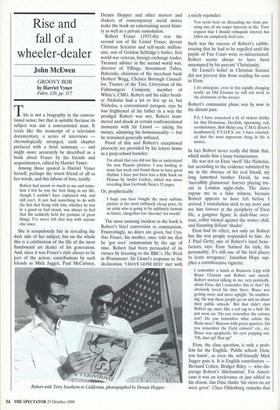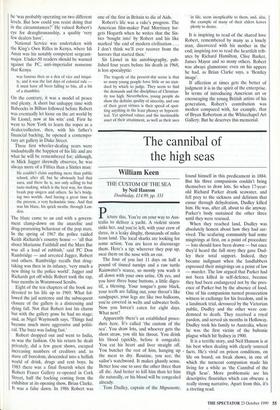Rise and fall of a wheeler-dealer
John McEwen
GROOVY BOB by Harriet Vyner Faber, f20, pp. 317
This is not a biography in the conven- tional sense; but that is suitable because its subject was not a conventional man. It reads like the transcript of a television documentary, a series of interviews chronologically arranged, each chapter prefaced with a brief summary — and might more accurately be described as a book about Fraser by his friends and acquaintances, edited by Harriet Vyner.
Among those quoted is Harriet Vyner herself, perhaps the truest friend of all as her words, and this labour of love, testify:
Robert had meant so much to me and some- how I felt he was the best thing in my life, though I couldn't have explained why and still can't. It just had something to do with the fact that being with him, whether he was in a good or bad mood, was always to feel that life suddenly held the promise of great things. I've never felt that way with anyone else since.
She is scrupulously fair in revealing the dark side of her subject, but on the whole this is a celebration of the life of the most flamboyant art dealer of his generation. And, since it was Fraser's style always to be part of the action, contributions by such friends as Mick Jagger, Paul McCartney, Dennis Hopper and other movers and shakers of contemporary social mores make the book an entertaining social histo- ry as well as a private consolation.
Robert Fraser (1937-86) was the second son of Sir Lionel Fraser, devout Christian Scientist and self-made million- aire, son of Gordon Selfridge's butler, first world war veteran, foreign exchange trader, Treasury adviser in the second world war, director of Tillings, Investment Tubes, Babcocks, chairman of the merchant bank Herbert Wagg, Chelsea Borough Council- lor, Trustee of the Tate, Liveryman of the Fishmongers' Company, member of White's, CMG. Robert and his elder broth- er Nicholas had a lot to live up to, but Nicholas, a conventional paragon, says he was frightened of his father in a way the prodigal Robert was not. Robert stam- mered and shook at certain confrontational moments with Sir Lionel — asking. for money, admitting his homosexuality — but he remained generally unfazed.
Proof of this and Robert's exceptional precocity are provided by his letters home as a prep-school boarder:
I'm afraid that you did not like or understand the new Picasso pictures. I was looking at some last week and found them to have great rhythm. I have just been lent a little book on Picasso by Andre Leclerc, which was more revealing than Gertrude Stein's 55 pages.
Or, prophetically:
I hope you have bought the most sublime picture at the most sublimely cheap price, by an artist who is going to be sublimely famous in future, altogether too `deevine' for words!
The most amusing incident in the book is Robert's brief conversion to communism. Frustratingly, no dates are given, but Cyn- thia Fraser, his mother, once told me that he 'got over' communism by the age of nine. Robert had been persuaded of its virtues by listening to the BBC's The Week in Westminster. Sir Lionel's response to the declaration 'I HAVE GONE RED' met with Robert with Teny Southern in California, photographed In' Winn, 1lopper.
a steely rejoinder:
You seem bent on dissuading me from pur- suing one of my major interests in life. Your request that I should relinquish interest has fallen on completely deaf ears.
Such was the success of Robert's rabble- rousing that he had to be expelled until the pupils of Fan Court were re-indocrinated. Robert seems always to have been untempted by his parents' Christianity.
Sir Lionel's belief in Christian Science did not prevent him from sending his sons to Eton:
I do anticipate, even in this rapidly changing world, an Old Etonian tie will not work to the detriment of the wearer.
Robert's communist phase was by now in the distant past:
P.S. I have conceived a fit of violent dislike for that Demoniac, Devilish, riproaring, red, revolutionary, Bob Birley esq. C.M.G [Eton's headmaster]. P.T.O.P.S. etc. I have conclud- ed that the most important thing in life is money.
In fact Robert never really did think that, which made him a lousy businessman.
He was not an Eton 'swell' like Nicholas, but according to the evidence submitted by me in the absence of his real friend, my long lamented brother David, he was 'incredibly glamorous' forever playing tru- ant in London night-clubs. The dates expose me as a false witness, because Robert appears to have left before I arrived. I nonetheless stick to my story and see him forever at the periphery of Eton life, a gangster figure in dark-blue over- coat, collar turned against the winter chill, and flaunting defiant 'shades'.
Eton had its effect, not only on Robert but the way people responded to him. As J. Paul Getty, one of Robert's loyal bene- factors, says, Eton 'formed his style, his personality. It's still one of the best places to learn arrogance.' Jonathan Hope sup- plies a corroborative vignette:
I remember a lunch at Brasserie Lipp with Bruce Chatwin and Robert and myself. Robert started talking to me, very pointedly, about Eton: did I remember this or that? He obviously loved his time there. Bruce was getting more and more uptight. 'So madden- ing, the way these people go on and on about their public schools.' But that didn't shut Robert up, more like a red rag to a bull. He just went on: 'Do you remember the colours test? Do you remember what colour the Boats were? Maroon with green quarters. Do you remember the Field colours? etc., etc. Bruce was apoplectic, his eyes popping out. 'Oh, shut up! Shut up!'
Eton, the class question, is only a prob- lem for the English. 'Public school: Eton, you know', as even the toff-friendly Mick Jagger puts it. It is English contributors Bernard Cohen, Bridget Riley — who dis- parage Robert's 'dilettantism'. For Ameri- cans it was an irrelevance or just added to his charm. Jim Dine thinks 'his views on art were great'. Claes Oldenburg remarks that he 'was probably operating on two different levels. But how could you resist doing that in the circumstances?' He valued Robert's eye for draughtsmanship, a quality 'very few dealers have'.
National Service was undertaken with the King's Own Rifles in Kenya, where Idi Amin was his notably competent sergeant- major. Under-50 readers should be warned against the PC, anti-imperialist nonsense that Kenya
was famous then as a den of vice and iniqui- ty, and it was the last days of colonial rule it must have all been falling to bits, all a bit of a shambles.
On the contrary, it was a model of peace and plenty. A short but unhappy time with Babcocks in Bilbao followed before Robert was eventually let loose on the art world by Sir Lionel, now at his wits' end. First he went to New York to learn the ropes as a dealer/collector, then, with his father's financial backing, he opened a contempo- rary art gallery in Duke Street.
These first wheeler-dealing years were undoubtedly the happiest of his life and are what he will be remembered for; although, as Mick Jagger shrewdly observes, he was always more of a Fifties than a Sixties man.
He couldn't claim anything more than public school, after all, but he obviously had that aura, and there he is, not only selling to but taste-making, which is the best way, for those brash pop singers and others. So he's bridg- ing two worlds. And having a great time in the process, a very hedonistic time. And that was his blaze, his quick swathe through Lon- don.
The blaze came to an end with a govern- ment clamp-down on the anarchic and drug-promoting behaviour of the pop stars. In the spring of 1967 the police raided Keith Richards's country house — 'all that about Marianne Faithfull and the Mars Bar was all a load of rubbish,' said PC Don Rambridge — and arrested Jagger, Robert and others. Rambridge recalls that drug- taking was then in its infancy, 'very much a new thing in the police world'. Jagger and Richards got off while Robert took the rap, four months in Wormwood Scrubs.
Eight of the ten chapters of the book are devoted to his life up to 1969. What fol- lowed the jail sentence and the subsequent closure of the gallery is a distressing and dying fall. Not that Robert lost his charm but with the gallery gone he had no stage; and, as Nigel Waymouth says, 'Things had become much more aggressive and politi- cal. The buzz was fading fast.'
Robert dropped out and went to India, as was the fashion. On his return he dealt privately, did a few guest shows, escaped increasing numbers of creditors and, to stave off boredom, descended into a hellish world of drink, drugs and rent boys. In 1983 there was a final flourish when the Robert Fraser Gallery re-opened in Cork Street, half the backing coming from the exhibitor at its opening show, Brian Clarke. It was a false dawn. In 1986 Robert was one of the first in Britain to die of Aids. Robert's life was a rake's progress. The American film-maker Paul Morrissey for- gets Hogarth when he writes that the Six- ties 'bought into' by Robert and his like marked 'the end of modem civilisation . . . I don't think we'll ever recover from the horrors that started then.'
Sir Lionel in his autobiography, pub- lished four years before his death in 1968, is less apocalyptic:
The tragedy of the present-day scene is that so many young people have little or no stan- dard by which to judge. They seem to find the demands and the disciplines of Christian- ity too high. Nevertheless, young people do show the definite quality of sincerity, and one of their great virtues is their speed of spot- ting anything in the least phoney or hypocrit- ical. Yet spiritual values and the inestimable asset of their attainment, as well as their uses in life, seem inexplicable to them, and, alas, the example of many of their elders leaves plenty to desire.
It is inspiring to read of the shared love Robert, remembered by many as a lonely man, discovered with his mother in the end; inspiring too to read the heartfelt trib- utes by Richard Hamilton, Clive Barker, James Mayor and so many others. Robert was always glamorous; even on his uppers he had, as Brian Clarke says, a 'Bentley image'.
If affection at times gets the better of judgment it is in the spirit of the enterprise. In terms of introducing American art or encouraging the young British artists of his generation, Robert's contribution was modest compared with, for example, that of Bryan Robertson at the Whitechapel Art Gallery. But he deserves this memorial.



















































































 Previous page
Previous page